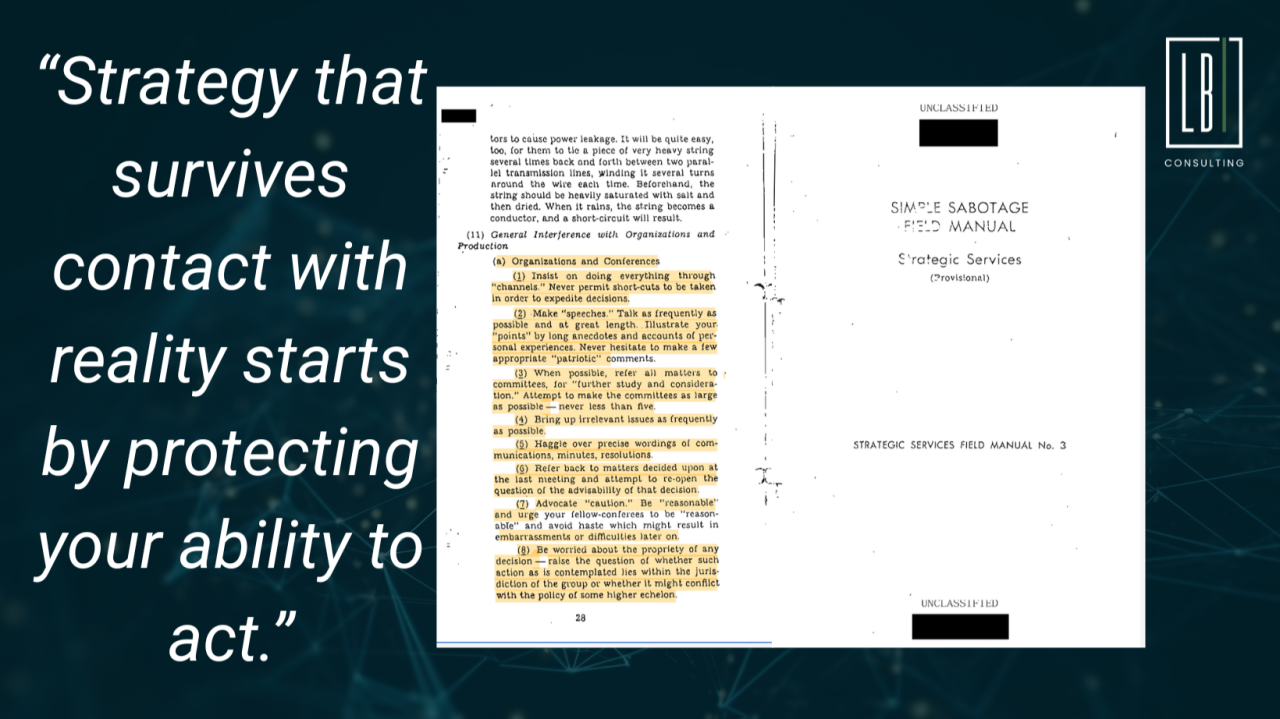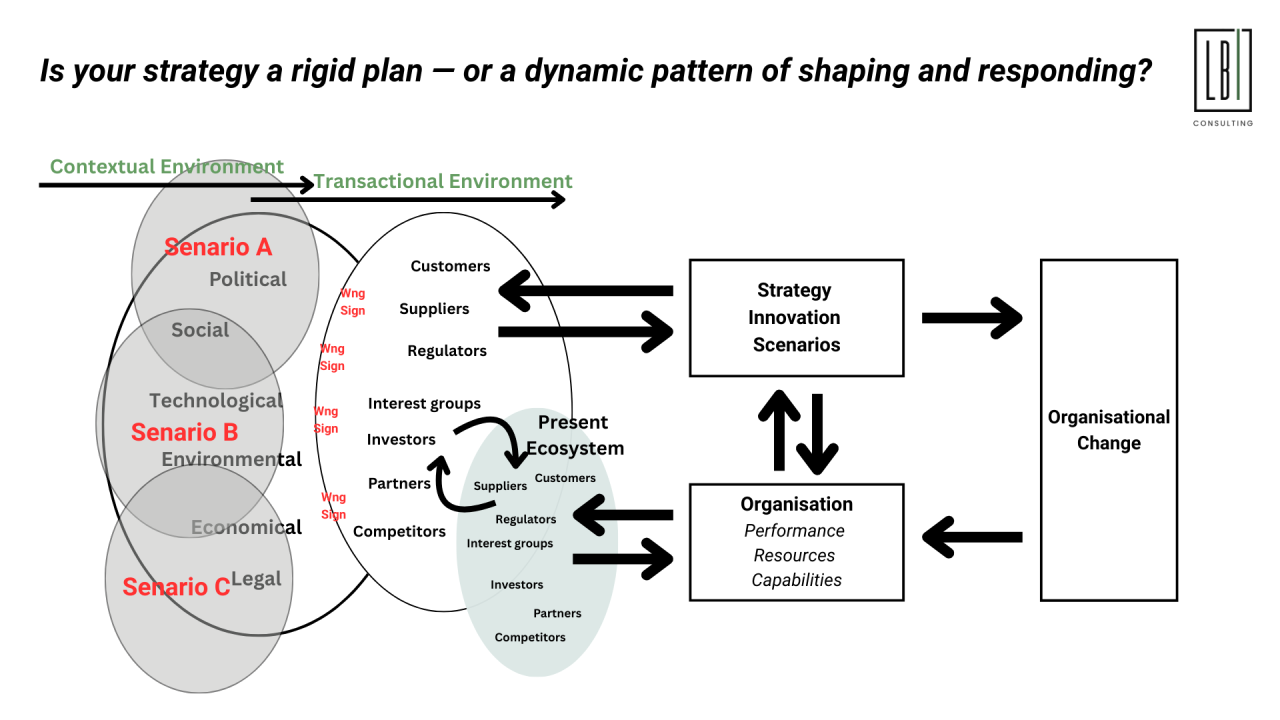
Insights on Strategy, Execution & Complex Organisations
I write about how strategy, execution and organisational design work in real-world environments — the kind that resist simple plans, reward systems thinking, and require leaders to adapt with clarity and purpose. Here you’ll find insights on strategic ambiguity, strategic manoeuvre, organisational viability, decision-making in complexity, and practical leadership thinking.
Browse the latest articles, or explore by topic below.
Organisation Shapes Strategy: Rethinking the Two-Way Relationship
On structural coupling, capability, and the real limits of choice
We often talk about strategy as if it comes first. Leaders design a strategy, and then “align” the organisation to deliver it. The familiar mantra is form follows function.
But the reality is more complex. Strategy and organisation are not linear. They are coupled.
Strategy as a way of being, not an output
Too often, we talk about strategy as if it were an artefact. Something you produce, publish, and put on a shelf. A plan, a framework, a deck.
But strategy is not a thing. It is not an output.
Strategy is a way of being.
It is lived. It is enacted. It is a way of thinking, a way of behaving, and most of all, the ongoing pursuit of viability.
A Strategy that Survives Contact with Reality Starts by Protecting Your Ability to Act
Most strategies fail because people are boxed in, not because they’re unmotivated
We spend too much time assuming strategy fails because of poor thinking, faulty plans, or lack of buy-in. But more often, strategy fails in execution because, when it meets the real world, the organisation is unable to act.
Not unwilling. Unable.
How strategy execution really fails: Lessons from the CIA's simple sabotage manual.
The real enemy of execution isn't resistance. It's subtle sabotage disguised as regular work.
In 1944, the CIA's predecessor, the OSS, published a field guide to help ordinary citizens sabotage enemy operations from within. The now-declassified Simple Sabotage Field Manual is both darkly comic and brutally insightful.
Aspiration After Observation: Why Strategy Starts with Seeing, Not Saying
Too often, purpose is treated as something you declare, design, and disseminate. It's written on the walls, embedded into decks, and broadcast at town halls. But when leaders treat purpose as real simply because it's been said, they mistake narrative for reality, and control for coherence.
Here’s the uncomfortable truth: It doesn’t matter what you say your organisation exists to do. It matters what your organisation actually does.
Strategy is not a fixed aspiration.
Rethinking aspirations, planning cycles, and the complexity we're actually in.
We must move on from the idea that strategy is a five—or ten–year plan—a fixed vision we march toward. It's comforting fiction: plot the course, cascade the goals, align the incentives. But strategy doesn't live in Gantt charts or glossy roadmaps. It lives in relationships, tensions, and how we continually navigate change.
Beyond holacracy and the decision tree: The critical role of coherence in adaptive organisations
In the rapidly shifting terrain of organisational management, debates around structure have become increasingly prominent. On one side, there are proponents of trendy frameworks like Holacracy, which advocate for flat, self-organising teams with distributed authority.
On the other hand, traditional hierarchical structures still hold sway, promising clarity and stability in decision-making. Yet, the real challenge facing organisations today isn't about choosing between hierarchy and flat structures.
Embracing Complexity: A Holistic Approach to Building Self-Organising and Adaptive Organisations
I propose a holistic approach to enabling organisations to operate in increasing complexity and uncertainty, allowing them to be self-organising, self-regulating, and adaptable. This holistic approach looks to develop a synergy between the Viable Systems Model (VSM), the principles of Misson Command and a culture of decentralised decision-making.
Mike's presentation delves into the complexities of the modern business landscape, sharing insights and approaches that can help leaders navigate challenges effectively.
In complex and high-stakes environments, stability is an illusion. Reflecting on my experiences as a soldier in Afghanistan, this talk explores the challenges of adapting strategy and execution in the face of chaos, risk aversion, and an agile adversary.
Podcasts and Talks.
Apperences from our founder Mike Jones.
Systems Thinking and Strategy for Leaders : Join us for an insightful interview with Mike Jones, founder and director of LBI Consulting, as we dive into the world of systems thinking and strategy.
In this reflective solo episode, Mike Jones steps back from the guest chair to explore a deeper truth: strategy is failing long before execution begins.
Mike sees strategy not as a top-down process, where the wishes of management become the gospel of the employees: strategy emerges from the actions of all. In this process, the Viable System Model is a valuable tool to develop a strategy and Mike explains how.








